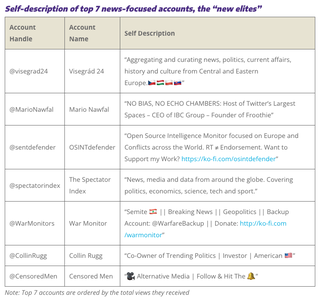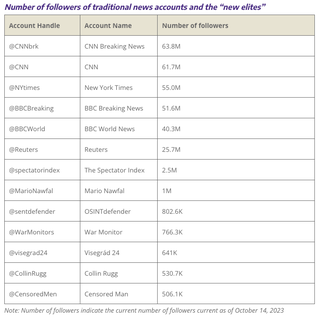An unorthodox group of 7 users is now the most dominant news source for information about the Israel-Hamas war on X (formerly Twitter), according to a new report from the University of Washington’s Center for an Informed Public. Dubbed the “New Elites” of X, the report found these users racked up 1.6 billion views on the platform in the first three days of the conflict, making them far more influential than traditional news outlets including the New York Times, CNN, and the BBC. Many of the accounts have been promoted by Elon Musk in the past.
The research comes amid a broader conversation about the influence of social media in a time of crisis. Immediately after the Hamas attacks, the platform was reportedly flooded with misinformation about the war, drawing criticism from regulators and calls for other platforms to fill the news void left in Musk’s wake. The University of Washington’s report was published the same day as a NewsGuard study which found that X’s blue-checked verified users produce 74% of misinformation on the platform, which then spreads to the rest of the internet.
Indeed, X’s New Elites are all verified users, and several have a reputation for posting misinformation, including @sentdefender, @spectatorindex, and @WarMonitors. According to the report, the New Elites tweet in a style that erases context, spreads disturbing imagery, and adds to the emotionally charged nature of discussions surrounding the situation in Gaza.
However, the researchers say the broader problem is a question about what counts as “news” in the modern social media landscape. “The issue here isn’t misinformation — though misinformation can be involved. The issue is what the news environment looks like,” said Mike Caulfield, a research scientist at the University of Washington and the report’s lead author. “There’s really two different visions of what that news environment should be. Our report shows that one of those visions has become dominant on X.”

Most of the new elites are accounts run by individual people. @Censoredmen, for example, primarily tweeted about misogynist internet star Andrew Tate before switching to news content. But others are full-blown media operations. The top-performing account is @Visegrad24, a Poland-based enterprise of about 12 people that grew to prominence tweeting about the war in Ukraine.
“I do think that there is a problem with the mainstream media maintaining absolute control on certain narratives,” Stefan Tompson, who started the Visegrad 24 account with his brother in 2020, told Gizmodo. Tompson, a PR strategist who got his start working on the “Leave” side of the Brexit campaign, said he’s preparing to launch a brand new media company with a team of journalists to build on Visegrad 24’s success. His newfound influence comes with an ironic respect for the traditional media he started out criticizing. “I understand there is a genuine threat if we do get something wrong,” he said. “It has real-life consequences. I look at that, and I sort of understand a lot of the regulations and limits and restraint around of a lot of the mainstream media.”
The news environment that dominates X isn’t necessarily what users are asking for. The top six traditional news accounts on X belong to the BBC, CNN, the New York Times, and Reuters. Collectively, those accounts have 298.1 million followers — nearly 100 times more than the New Elites, who together amount to just 3.2 million followers. In other words, the platform isn’t serving up the news content that users explicitly request when they hit the follow button.
But when you look at the engagement these accounts receive, the New Elites are winning by a mile. Together, the report found the top six traditional media outlets got 112 million views on Israel-Hamas news in the first three days of the conflict. The New Elites earned 1.6 billion views. Visegrad 24 generated 370 million views alone.
“Our sense, which I think is supported by the number of people who have followed traditional news sources there, is that is not the vision a lot of users of X had when they signed up,” Caulfield said.
For many, the Israel-Hamas conflict has been a wake-up call for the health of X’s news ecosystem. X CEO Linda Yaccarino maintains the platform is fighting to address the issue, but Musk has demonstrated it’s a problem he doesn’t take seriously. In September, for example, X disabled the option to report misinformation on the platform.
“If you look at all my posts, especially in the peak of the war, all of them have a source,” Mario Nawfal, the second most influential member of the report’s New Elite, told us. His account is also run by an entire team of people, and he’s one of the biggest stars on Musk’s revamped platform.
Nawfal, who rose to prominence with content about cryptocurrency, said he’s committed to accuracy and unbiased information. At the same time, he’s a controversial figure in his own right who’s been accused of shady business dealings in the past, something Nawfal categorically denies. He’s also been charged with cutting corners to juice his engagement on X, but Nawfal told Gizmodo most of his tweets come straight from established news outlets. “We have a list of media sources that we use,” he said. “Some we’ll post immediately. Others, like Al-Quds, we have to verify because they’re not as accurate as others.”
The report used a novel approach to analyze the Israel-Hamas discourse on X. The researchers collected every tweet mentioning related terms including “Gaza,” “Israel,” and “Hamas” with at least 500 likes sent between October 7th (the day of the initial Hamas attack) and October 10th. The researchers then examined every X user in the data set and tallied the total number of views their tweets received. That generated a list of the 10 most influential accounts, but the report excluded @elonmusk and @POTUS because they aren’t primarily new-focused. (Musk and the President’s account were also some of the least influential on the list in terms of views.) Because the report focused on English-language news, the researchers also excluded @AlertaNews24, which tweets in Spanish.
Like Tompson, Nawfal is less critical of mainstream media outlets than you might expect. “I’ve always been pretty vocal that the world needs traditional media,” he said. But Nawfal said the traditional media’s recent shortcomings on X stem from a failure to tailor their content to the platform. “X has been pretty transparent about what works and doesn’t work,” Nawfal said. “It’s just an algorithm, and it represents what people want to read. They want the news, but they want it in a specific format.”
Gizmodo reached out to the other members of the New Elites but didn’t hear back. X did not respond to a request for comment.
The New Elites have advantages that are generally unavailable to traditional media organizations. Unlike more established news outlets, these accounts often share “breaking news” that hasn’t been verified, and they rarely cite sources. As the report points out, that comes with a major risk of sewing misinformation.
“I actually agree with that criticism, but I think it’s inevitable that the space will be filled with people who move too fast,” Tompson said. “But if it’s not us, you’ll have someone far worse doing it, spreading misinformation on purpose for clicks and engagement. I don’t see a remedy.”
Unlike the other members of the new elite, Nawfal and an account called @WarMonitors do mention where they get their news. However, the report said this doesn’t go far enough, because their tweets don’t include links to the original articles.
“It’s a fair piece of criticism,” Nawfal said, but it’s a strategic approach because X’s algorithm demotes tweets that include links to other websites. However, Nawfal said he plans to experiment with adding links in the comments in response to the report’s critique. Tompson said he’s frustrated that his team doesn’t include information about sources in @Visegrad24’s tweets. Like Nawfal, he said he plans to push them to add those details going forward.
Another key aspect of the New Elites’ success comes from Elon Musk himself. The billionaire explicitly recommended users follow @sentdefender and @warmonitors for Israel news, despite the fact that both have a history of posting misinformation. (After the Washington Post wrote an article criticizing Musk for the recommendation, he deleted the tweet.) To name one example, both accounts reported a false claim in May that there had been an explosion near the White House.

Musk has personally appeared on Nawfal’s live audio streams on X Spaces. And with the exception of @spectatorindex, Musk has replied to every one of the New Elites’ accounts since he took over Twitter, skyrocketing their visibility. He also follows three of them and even has a paid subscription to four of their accounts, including Nawfal, @sentdefender @CollinRugg, @WarMonitors
“There is every indication that this is the sort of news ecosystem [Musk] is trying to build,” Caulfield said. “I don’t think this is some secret plan. I think if you asked Musk about this he’d probably say, yes, this is what news should be — more raw, more unfiltered, less links to longer reads elsewhere.”
Aside from problems with sourcing and accuracy, the report also highlights that many of these accounts boost engagement by framing their content with emotionally charged language. The New Elites’ tweets also tend to harness violent and sometimes disturbing imagery, including footage of dead or injured victims and airstrikes.
“While traditional news does at times use such imagery as well, the sheer volume of these tweets, combined with the lack of deeper analysis or context mentioned above, created for our analysts the sense of a constant stream of decontextualized anger and violence when analyzing these accounts,” the report said.
In the past, X (then Twitter) allowed for free access to the company’s internal data, which let researchers unpack a deeper understanding of what’s happening on social media in real-time. That was the established norm in the social media industry, one that Musk quickly discarded. The billionaire set up a prohibitively expensive paywall for X’s API, the tool that lets outsiders analyze the platform. Researchers are developing new techniques to study X, but thorough investigations are far more difficult and sometimes impossible. In many respects, X is now a black box.
Caulfield said that makes it hard to compare X’s current landscape to the news ecosystem that flourished before Musk’s takeover. “What we can say is that most of these accounts we describe are newly popular, and the style of posting they use feels different than what we’ve seen before,” he said. “But quantifying that shift is going to take a lot more work. In the meantime, I think it’s fair to say if you’ve sensed a shift in what appears in your feed, you’re probably not imagining it.”
